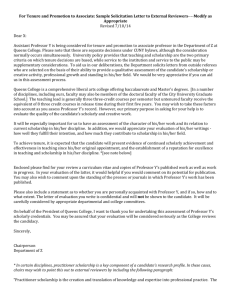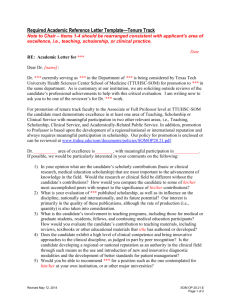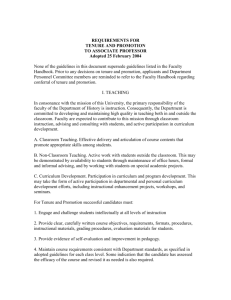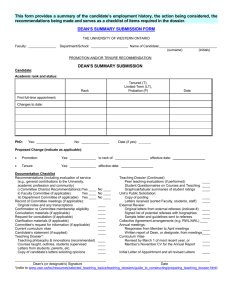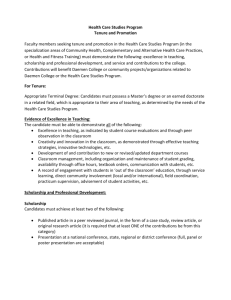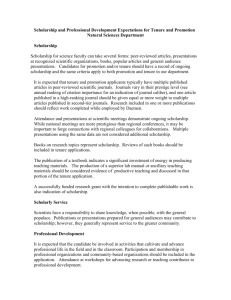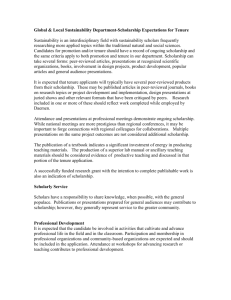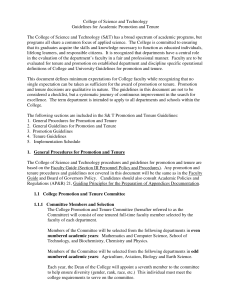TENURE AND PROMOTION - UNM OFAS
advertisement
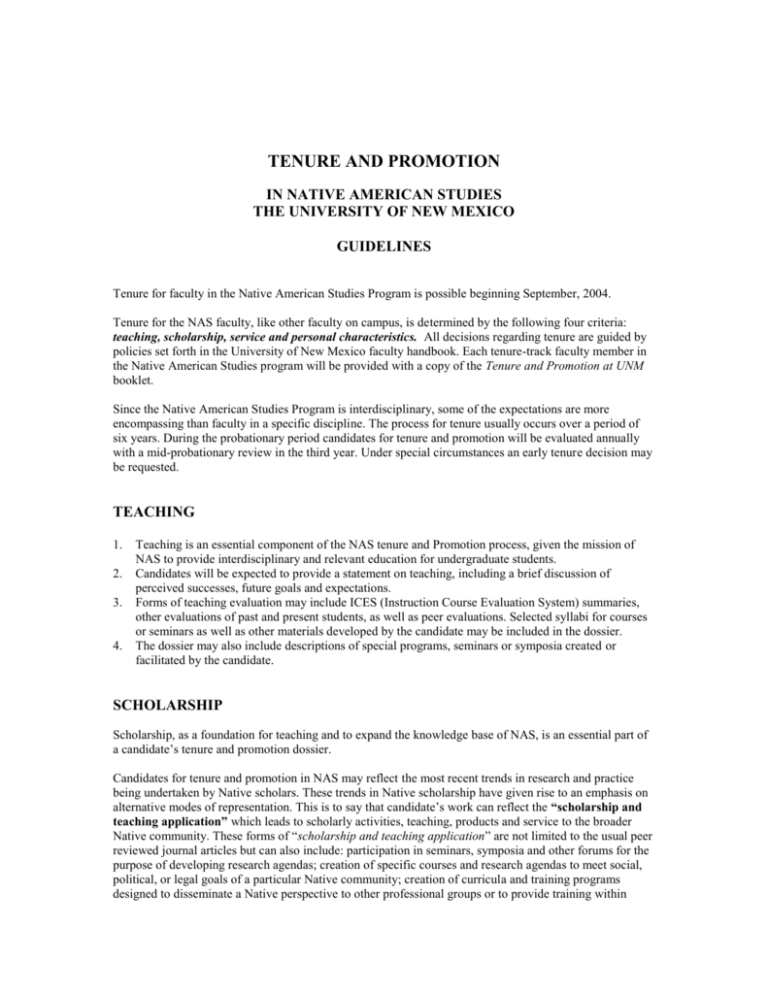
TENURE AND PROMOTION IN NATIVE AMERICAN STUDIES THE UNIVERSITY OF NEW MEXICO GUIDELINES Tenure for faculty in the Native American Studies Program is possible beginning September, 2004. Tenure for the NAS faculty, like other faculty on campus, is determined by the following four criteria: teaching, scholarship, service and personal characteristics. All decisions regarding tenure are guided by policies set forth in the University of New Mexico faculty handbook. Each tenure-track faculty member in the Native American Studies program will be provided with a copy of the Tenure and Promotion at UNM booklet. Since the Native American Studies Program is interdisciplinary, some of the expectations are more encompassing than faculty in a specific discipline. The process for tenure usually occurs over a period of six years. During the probationary period candidates for tenure and promotion will be evaluated annually with a mid-probationary review in the third year. Under special circumstances an early tenure decision may be requested. TEACHING 1. 2. 3. 4. Teaching is an essential component of the NAS tenure and Promotion process, given the mission of NAS to provide interdisciplinary and relevant education for undergraduate students. Candidates will be expected to provide a statement on teaching, including a brief discussion of perceived successes, future goals and expectations. Forms of teaching evaluation may include ICES (Instruction Course Evaluation System) summaries, other evaluations of past and present students, as well as peer evaluations. Selected syllabi for courses or seminars as well as other materials developed by the candidate may be included in the dossier. The dossier may also include descriptions of special programs, seminars or symposia created or facilitated by the candidate. SCHOLARSHIP Scholarship, as a foundation for teaching and to expand the knowledge base of NAS, is an essential part of a candidate’s tenure and promotion dossier. Candidates for tenure and promotion in NAS may reflect the most recent trends in research and practice being undertaken by Native scholars. These trends in Native scholarship have given rise to an emphasis on alternative modes of representation. This is to say that candidate’s work can reflect the “scholarship and teaching application” which leads to scholarly activities, teaching, products and service to the broader Native community. These forms of “scholarship and teaching application” are not limited to the usual peer reviewed journal articles but can also include: participation in seminars, symposia and other forums for the purpose of developing research agendas; creation of specific courses and research agendas to meet social, political, or legal goals of a particular Native community; creation of curricula and training programs designed to disseminate a Native perspective to other professional groups or to provide training within Native communities; participation in programs integrating various bodies of knowledge and a range of cultural values within academic knowledge and teaching praxis; community based teaching and learning and; creation of visual, print, audio or digital curricular materials. Overall, a candidate’s dossier may include any of these components of contemporary Native Scholarship for consideration. 1. 2. 3. The candidate is expected to provide a comprehensive but concise statement of scholarship. The statement should include a description of the contribution they believe their research has made to the evolving discipline of Native Studies. Scholarship will be evaluated on quality and relative impact of research to the field of Native Studies. It is important to stress quality rather than mere quantity, but a sufficient number of publications or creative works are necessary. There are various ways to fulfill this criteria with traditional and some non-traditional forms of publication. A dossier may include both forms. It is the view of UNM-NAS that the inclusion of non-traditional forms of scholarship in no way diminishes the importance of traditional scholarship but rather enhances and extends it. Appropriate material may include: a. Scholarly Book(s) (related to Native American Studies or candidate’s discipline). b. Articles (at least three of which appear in peer reviewed journals related to an area of Native American studies). c. Creative work(s) (novels, short stories, poetry, visual or sculptural art work, film, video, musical or theatre productions, etc. d. Grants (awarded or applied for related to candidate’s work in Native Studies). e. Presentations (professional conferences or other similar settings in Native contexts or in the candidate’s discipline). Publications should be in journals with high reputation in Native professional contexts or the candidate’s discipline). SERVICE 1. Service contributions to the NAS program, University College, the University College and the New Mexico, National or International Indigenous community are the priority of this category. Service can include a range of activity such as direct work with community projects, community service, program development and or research or grant writing that directly benefits constituent communities. PERSONAL CHARACTERISTICS 1. *Professionalism, cooperation, commitment and leadership relative to the work of candidate in the Native Studies Program are the key evaluative criteria used in this segment of the evaluation for tenure and promotion. Generally, personal traits are evaluated through their reflection in the student and peer evaluations and through the overall all body of professional work and performance by the candidate. Collegiality is very important in the smooth operation of a department and therefore has a direct bearing on the overall evaluation in this area of evaluation for tenure and promotion. * Candidates are encouraged to discuss these criteria and the development of their dossier for the tenure and promotion with the Chair of Native Studies, the Dean of University College or colleagues who have recently completed the process.
